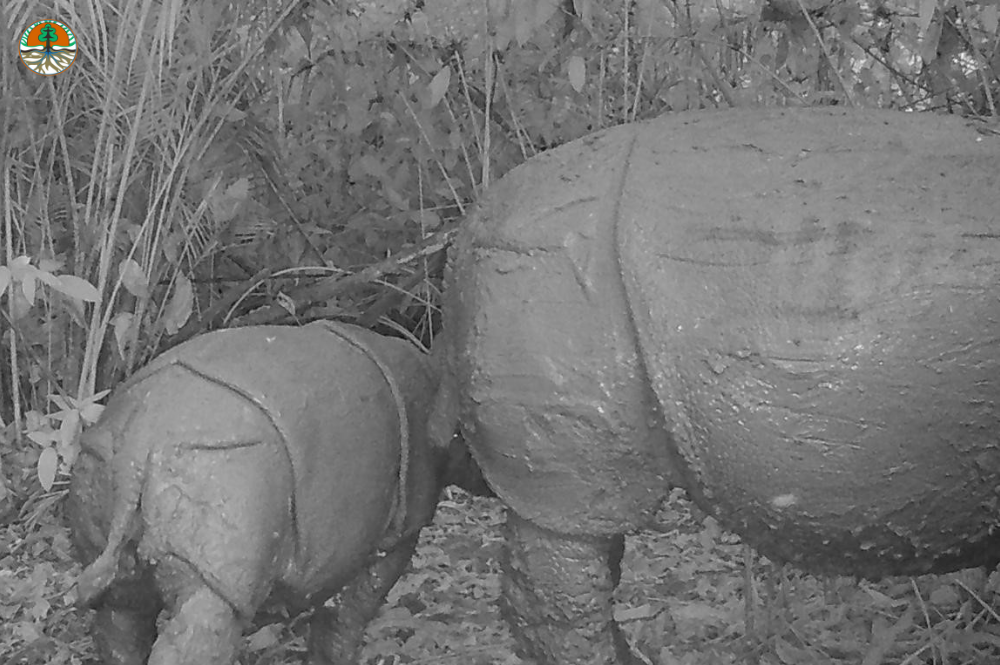Image courtesy of the Indonesian Ministry of Environment and Forestry.
In May, we shared the devastating news that multiple Javan rhinos had been illegally killed by poaching gangs between 2019 and 2023. As one of the rarest mammals on Earth, this is a huge loss.
We have been closely following the developments since and can now share updates on the court cases that have taken place so far, the ongoing protection and conservation activities in Ujung Kulon National Park (UKNP) and the exciting arrival of five new calves.
Poaching and Prosecutions
The Government of Indonesia, alongside Park authorities, local police and the military, has undertaken a significant response since the first Javan rhino poaching incident was discovered. It has been confirmed that there was ‘insider involvement’ in the cases, with a member of the Rhino Protection Units alleged to have shared information with criminal networks. So far, this individual has evaded arrest, though others linked to the poaching cases have been arrested, including members of two gangs and two middlemen involved in trading the rhino horns. Bringing these criminals to justice has been a complex process.
Currently only two individuals – Sunendi and Yogi – have been successfully prosecuted and sentenced for their roles in illegally killing rhinos and trafficking their horns. Sunendi was convicted and sentenced to 12 years in jail, the longest sentence ever given for a wildlife-related crime in Indonesia. He was proven guilty of illegally killing six rhinos, stealing camera traps and possessing illegal firearms. Yogi Purwadi, who was a trader and intermediary working with Sunendi and others, was sentenced to 4.5 years in jail for his role in illegally selling horns.
Their convictions are a crucial step in tackling the wildlife crime networks operating not only in Indonesia but also internationally, as reports suggest the horns were destined for China.
In August, the trial of suspected rhino horn buyer, Liem Hoo Kwan (also known as ‘Willy’) took place. During the trial, Sunendi presented evidence about Willy’s role in the trading of rhino horns. Liem Hoo Kwan was originally sentenced to five years in prison, but this ruling was overturned by the lead judge two weeks later and Willy was acquitted. The prosecutors say they will appeal this decision.
So far, we are unaware of any further trials having taken place for the other individuals originally arrested.
Most recently, authorities have been investigating links between Sunendi’s gang and a man in Sumatra. The individual, who is yet to be identified, was arrested on 23 August 2024 for allegedly attempting to sell eight rhino horns, five tobacco pipes made of elephant ivory, and three pipes made from dugong tusks. Four of the horns have been determined to be of Indonesian origin; the others are understood to be from abroad.
Increased Action in Ujung Kulon National Park (UKNP)
This direct connection between the trafficking of rhino horns (and other illegal wildlife products) from multiple countries is worrying, though it isn’t surprising. We know that the illegal wildlife trade is a serious, organised and transnational crime that poses a huge threat to endangered species including rhinos. Understanding the connections between the individuals involved at all levels, between networks and across borders, is key to dismantling them.
To protect rhinos and support important security interventions, authorities increased funding availability to the Park, closed public access to the UKNP peninsula in 2023 and deployed greater numbers of rangers alongside police and other personnel to patrol the Park’s forests.
Following these heightened security efforts, there has – thankfully – been no evidence of rhino poaching incidents during 2024.
We’re encouraged to see these steps have been taken and hope that, through more collaboration and ongoing improvements to the Park’s security and monitoring capacities, more can be done to protect the remaining Javan rhinos.
Glimmers of Hope: New Javan Rhino Calves
Despite the challenges, there is good news. Thanks to diligent monitoring of camera traps, at least four new Javan rhino calves have been recorded since August 2023! This exciting news provides a much-needed boost for this Critically Endangered species.
The Government of Indonesia shared news of a recent calf, named Iris, who was first seen in May 2024. Iris is estimated to be between three and five months old and is thought to be the first calf for her mother, Putri.
Iris’ birth, and the births of the other calves in UKNP, are incredibly significant. Each new addition gives us hope for the future of the species, showing that with the right protection, support and habitat, Javan rhinos can grow their population.
The Road Ahead
The path to save the Javan rhino is far from over. With poaching networks still active and ongoing cases to bring justice, the road ahead remains challenging. However, the dedication of conservationists, law enforcement, and the Government of Indonesia remains strong.
At Save the Rhino International, we are committed to supporting these efforts to ensure the survival of the Javan rhino. We are inspired by the birth of new calves, the passion from the community – both in Indonesia and internationally – and the tireless work of teams on the ground working to save this species from the edge of extinction. Together, we can protect this magnificent species for generations to come.








